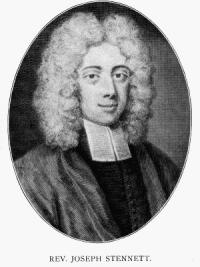1. Another six days’ work is done,
Another Sabbath is begun,
Return, my soul, enjoy your rest,
Improve the day that God has blest.
2.Come, bless the Lord, whose love assigns
So sweet a rest to wearied minds;
Our Saviour comes to us to speak
On this day more than all the week.
3. O that our thoughts and thanks may rise
As grateful incense to the skies;
And draw from Christ that sweet repose
Which none but he that feels it knows.
4. This heav’nly calm within the breast;
Is the best pledge of glorious rest,
Which for the church of God remains,
The end of cares, the end of pains.
Playback
Instrumental – Sampled Sounds
Download
| MP3 – Instrumental | PNG | |
| MIDI | XML | EPS |
| TXT | SIB7 / SIB3 | SVG |
The text for this hymn comes from James White’s second hymn collection, “Hymns for Second Advent Believers” published in 1852.
 It was taken from a longer set of verses originally composed by Joseph Stennett (1663-1712), a Seventh-day Baptist minister (and therefore a Dissenter). He was converted at a young age, due to the work of the Spirit of God and his parents. He married the daughter of a French Huguenot family who had fled for refuge to England during the time of the revocation of the Edict of Nantes. He received a broad education in languages, sciences, and philosophy, and also acquainted himself with the early and later church writings. This was an unusually broad education for a Dissenter, since the main English universities (Oxford and Cambridge) were closed to them in those days.
It was taken from a longer set of verses originally composed by Joseph Stennett (1663-1712), a Seventh-day Baptist minister (and therefore a Dissenter). He was converted at a young age, due to the work of the Spirit of God and his parents. He married the daughter of a French Huguenot family who had fled for refuge to England during the time of the revocation of the Edict of Nantes. He received a broad education in languages, sciences, and philosophy, and also acquainted himself with the early and later church writings. This was an unusually broad education for a Dissenter, since the main English universities (Oxford and Cambridge) were closed to them in those days.
In 1685, while visiting London, he wrote a twelve-verse poem on martyrdom, possibly in honor of Francis Bampfield, a Seventh Day Baptist minister who died in prison in 1683. Or he may have had in mind the recent persecution of Non-conformists in England, or the “killing time” of the Scottish Covenanters in 1684-1685.
At the age of twenty six he was appointed pastor for the Pinners’ Hall Seventh Day Particular Baptist Church, and although the pay was meagre, he accepted the call and served loyally for the next twenty three years, until his death. He often preached on Sundays for other congregations.
In 1693, Stennett came across Samuel Wesley’s long (348-page) poem, “The Life of Our Lord and Saviour, Jesus Christ” which had been dedicated to Queen Mary. The Queen had been impressed with this offering, and rewarded Wesley with the Epworth rectory, which was later to become famous when Wesley’s sons, John and Charles, led the Evangelical Revival in the 1700’s. Stennett probably never met Samuel Wesley, but did write a short poem in praise of the longer piece.
For a more complete history, and record of the poems of Stennett and his relatives, see the following website: The Stennetts of England. All of the information recorded here is derived from those web pages. Thanks to Allen Harrington for making me aware of this history.
Joseph Stennet’s father, Edward, wrote a few articles in defense of the seventh-day Sabbath. One of those is available on my other website: The Royal Law Contended For.
By the way, Joseph Stennett wrote many more verses to this poem than those listed in the song. I include them below because they give us a small insight into the devotional side of this faithful minister, and his gospel-oriented view of the Sabbath day:
| 1. Another six days work is done, Another sabbath is begun; Return, my soul, enjoy thy rest, Revere the day thy God hath bless’d. |
9. I offer all, my God, to thee: If thou accept both mine and me, I’ll praise thy grace, the name adore, And wish to offer I had more. |
| 2. But weep that thou hast done no more In this, and many weeks before, For him whom thou art bound to praise On working and on resting days. |
10. O that my thoughts and words may rise As incense to propitious skies; And fetch from heaven that sweet repose Which but he that feels it knows. |
| 3. If common actions ought to tend, To praise him as their common end; How should his glory be design’d In every thing of sacred kind. |
11. This heavenly calm, within the breast, Is the dear pledge of glorious rest, Which for the church of God remains, The end of cares, the end of pains. |
| 4. For servile work six days are given; For sacred use but one in seven: When for my work God gives such time, Shall I begrudge a day to him. |
12. With joy God’s wondrous works I view, In various scenes, both old and new: With praise I think on mercies past; With hope, of future pleasures taste. |
| 5. Lord, one in seven’s too much for me; And fix too little seems for thee: My time, my all besides, is thine; Nothing, no not myself, is mine. |
13. In holy duties, let the day In holy pleasures pass away; How sweet a sabbath thus to spend, In hope of one that ne’er shall end! |
| 6. Nothing I properly could claim, As truly mine, but sin and shame: This guilt thou hast remov’d; and given Thyself, thy son, thy grace, thy heaven. |
14. Till I am so divinely blest I’ll love this weekly day of rest; And still when days of work begin Remember there’s no time for sin. |
| 7. My soul with grateful ardor burns, My God, to make thee some returns: Well may I render thee thy own; Well mayst thou reap where thou hast sown. |
15. Come, bless the Lord, whose love assigns So sweet a rest to wearied minds; Provides an antepast of heaven, And gives this day the food of seven. |
| 8. This grateful soul by thee redeem’d This holy time by thee esteem’d And what I am or have beside, What I can give or thou provide. |
Tags: Sabbath



I just added the hymn poems by Joseph and Samuel Stennett
to The Stennetts of England
Greetings. Good to come across a good data-base of specific hymns of yesteryear. I was especially interested in the full length (15 sts.) version of Stennett’s “Another six days’ work is done”. I already have three different centos in my collection of c.40,000 hymns, and find that such full-length originals are often hard to locate. Congratulations. Thank you, and keep it up!
Gordon, thanks for the kind words. The pace of life and it’s duties prevents me from documenting some of these hymns as they could be. We need eternity to really do proper research, is it not so? If you see anything lacking here, or can add some comments to some of the hymns from your vast collection, feel free to send me the info. I’ll be glad to include anything that is helpful.